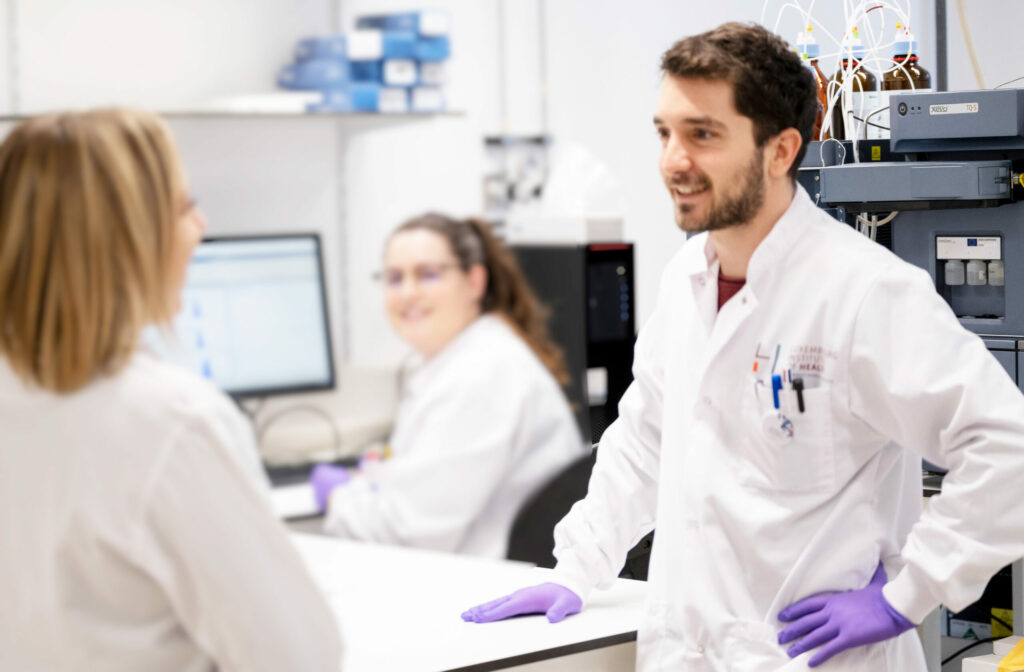
Forschungsgruppe Alterung, Krebs und Ungleichheiten
Thanks to a 5-year FNR ATTRACT fellowship, the interdisciplinary ACADI team will develop its research activities to improve cancer outcomes for everyone, with a focus on older adults.
Overview
The number of older people with cancer is increasing in Luxembourg. Recent evidence illustrates that older people have not benefited from the recent improvements in cancer diagnosis and treatment as much as younger patients, increasing the survival gap. Older adults are a heterogeneous group in terms of health status and fitness. They have unique needs and to address these, it is crucial to unpack drivers of inequities in cancer outcomes.
The ACADI team investigates key moments in the cancer pathway where inequalities are likely to occur, namely pre-diagnosis, treatment decision-making, and active treatment, and propose recommendations and interventions.
PRE-DIAGNOSIS
Older adults are more likely to be diagnosed with advanced cancer or in an emergency setting which has been associated with poor outcomes. One of the aims of ACADI is therefore to improve early diagnosis. The team investigates factors influencing time to cancer diagnosis in older adults and develop strategies to reduce the time between the onset of first symptoms and diagnosis, leading to improved cancer outcomes in older adults.
TREATMENT DECISION-MAKING
Clinicians have not historically had access to evidence-based treatment strategies for older adults because of underrepresentation of older patients in clinical trials. The team use cancer registry data linked to treatment and hospitalisation data to estimate the effect of anti-cancer treatment on toxicity and survival in older patients to inform treatment. In addition to improving the quality and types of evidence for treatment decision-making, integrating patient values in a shared decision-making process is important, particularly because of the complexity of cancer treatment and the high uncertainty around treatment benefits. Using qualitative (e.g., observation of medical encounters, interviews, and focus groups) and quantitative methods, the team analyse how patient values are integrated into management, and how this varies by age. This will allow for identifying room for improvement and proposing tailored training to medical staff.
ACTIVE TREATMENT
Chronological age is not a good proxy for physiological age in older patients. However, a comprehensive geriatric assessment to assess older patients’ fitness showed efficacy in improving cancer outcomes. To facilitate more widespread use of this tool, the team design a digital decision aid tool based on geriatric assessment items, to be used in clinical practice to help oncologists identify older patients who would benefit the most from treatment and those with vulnerabilities that may need to be addressed before undergoing treatment.
In addition, the team describe the epidemiology of cancer in older adults at national, regional and global levels to inform policymakers and encourage the inclusion of specific considerations for older adults in cancer control policies.
The findings of all these activities will be translated into recommendations and interventions to improve cancer outcomes in older patients.

Pilleron
Projekte und klinische Versuche
Ausgewählte Teammitglieder
Wissenschaftliche Veröffentlichungen
-
Attributing non-specific symptoms to cancer in general practice – 23/06/2025
-
Protocol for an umbrella review of systematic reviews evaluating the efficacy of digital health solutions in supporting adult cancer survivorship care – 27/05/2025
-
Exploring the status of online social support for older adults with cancer – 09/01/2025
-
Representation of geriatric oncology in cancer care guidelines in Europe – 11/04/2025
-
Strengthening interprofessional and interdisciplinary collaboration in geriatric oncology initiatives – 30/04/2025
-
Survival Outcomes for Post Colonoscopy Colorectal Cancers and Post Endoscopy Upper Gastrointestinal Cancers in England – 01/05/2025
-
The International Society of Geriatric Oncology (SIOG) Methods Working Group – 28/02/2025
-
The role of healthcare professionals‘ attitudes in treatment decision-making for older adults with cancer – 01/01/2024
-
Updated cancer burden in oldest old – 26/11/2024
-
Designing observational studies to estimate treatment effects in geriatric oncology – 26/11/2024
Ähnliche News
Anstehende Veranstaltungen

Stellenanzeigen
-
Internship Position in Cancer Disparities (Master’s students) (00412)
Department of Precision Health – Ageing Cancer & Disparities


























